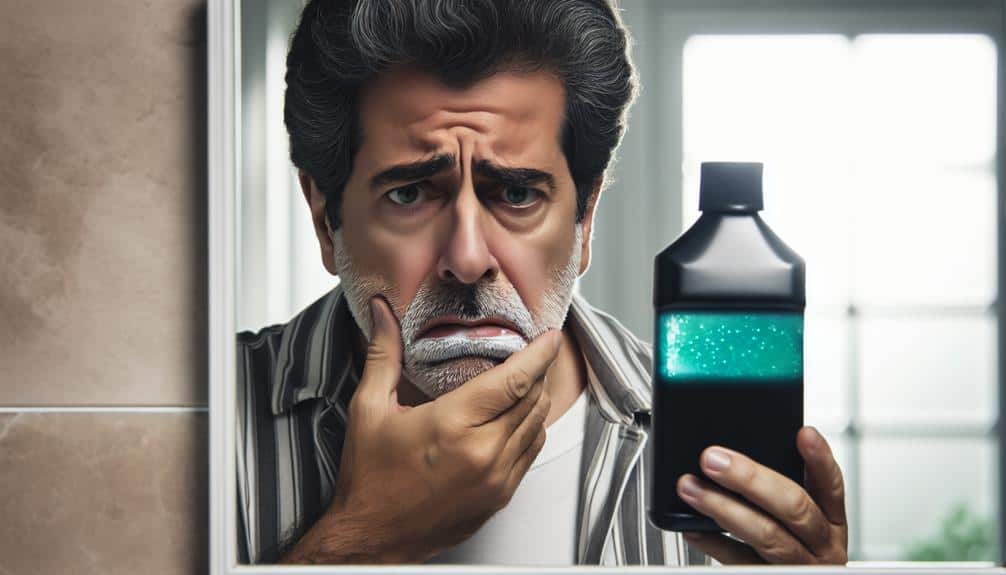When whitening your teeth at home, be cautious to avoid potential risks. Some DIY kits contain harsh chemicals that can harm your enamel. Watch for tooth sensitivity to hot and cold, which may increase with improper whitening techniques. To minimize these risks, choose dental-approved products, follow instructions closely, and use protective measures like dental dams. Remember, prioritizing safety in teeth whitening is essential for a successful outcome. Understanding these risks is vital for a healthy smile.
Key Points
- Choose dental-approved whitening products to minimize risks.
- Follow instructions precisely to prevent sensitivity and irritation.
- Protect gums with barriers like dental dams during whitening.
- Cease use and consult a dentist if side effects occur.
- Prioritize safety by monitoring for warning signs and adjusting treatment.
Potential Risks of DIY Teeth Whitening
To whiten your teeth at home with DIY methods, you should be aware of the potential risks involved in order to make informed decisions about your oral health. Two common risks associated with DIY teeth whitening are enamel damage and tooth sensitivity. Enamel, the outer layer of your teeth, can become weakened or damaged by the harsh chemicals found in some DIY whitening kits. This can lead to increased tooth sensitivity, making it uncomfortable to consume hot or cold foods.
Another risk to be cautious of is gum irritation, which may result from improper application of whitening agents. The chemicals in these products can irritate the sensitive gum tissue, causing discomfort and potential inflammation. Additionally, DIY methods may sometimes yield uneven results, with some teeth appearing whiter than others. This can be frustrating and may require additional treatments to achieve a uniform smile.
Being mindful of these risks and following proper guidelines can help minimize the chances of experiencing negative effects while attempting to whiten your teeth at home.
Side Effects to Watch Out For
When using DIY teeth whitening methods, monitor for potential side effects that can indicate the need to adjust your approach for safer outcomes. While DIY teeth whitening can be effective, there are potential dangers associated with it that you should be aware of.
One common side effect is tooth sensitivity, which may manifest as discomfort or pain when consuming hot or cold foods. Gum irritation is another warning sign to watch out for, often presenting as redness or swelling in the gum tissue.
Additionally, using whitening solutions excessively or incorrectly can lead to enamel damage, causing teeth to become brittle or discolored. If you experience any of these side effects, it's important to discontinue the whitening treatment and consult with a dental professional.
Safety Precautions When Whitening Teeth
Keep a close eye on your DIY teeth whitening process to make sure you're implementing the necessary safety precautions for protecting your oral health. When it comes to whitening your teeth at home, safety should be a top priority. Here are four key safety precautions to follow:
- Choosing Safe Products: Opt for teeth whitening products that are approved by dental associations or contain safe levels of bleaching agents to prevent damage to your enamel and gums.
- Proper Technique: Follow the instructions provided with the whitening product carefully. Avoid leaving the whitening agents on for longer than recommended to prevent sensitivity or irritation.
- Protecting Your Gums: Use barriers like dental dams or coconut oil to shield your gums from the whitening agents, reducing the risk of irritation or chemical burns.
- Monitoring Sensitivity: If you experience increased tooth sensitivity or gum irritation, discontinue use immediately and consult with a dental professional to avoid further complications.
Risks of Overusing Whitening Products
Overusing whitening products can lead to adverse effects on your dental health, causing potential harm to your enamel and gums. While these products are designed to remove stains and brighten your smile, excessive use can result in several potential dangers. Enamel, the outer layer of your teeth, can become weakened from overuse of whitening products. This can lead to increased tooth sensitivity, making it uncomfortable to consume hot or cold foods and beverages.
Additionally, enamel damage can pave the way for cavities and other dental issues. Gums may also be affected, becoming irritated and sensitive if exposed to whitening agents for prolonged periods. It's important to follow the recommended usage instructions provided with the whitening products to avoid these risks.
If you experience any signs of enamel damage or gum irritation, such as increased sensitivity or redness, discontinue use immediately and consult a dental professional for guidance on how to proceed.
Consulting a Professional Dentist
To guarantee the safety and effectiveness of your teeth whitening journey, seeking guidance from a professional dentist is essential. Here are four reasons why consulting a dentist is vital in your quest for a brighter smile:
- Professional Advice: Dentists are trained professionals who can assess your oral health and determine the best whitening method suitable for you.
- Expert Opinion: With their expertise, dentists can provide personalized recommendations based on your dental history and current oral condition.
- Safe Practices: Dentists make sure that the whitening products used are safe for your teeth and gums, reducing the risk of potential damage.
- Monitoring Progress: Regular check-ups with a dentist allow for the monitoring of your whitening progress and any potential side effects, ensuring a successful outcome while safeguarding your dental health.
Frequently Asked Questions
Can DIY Teeth Whitening Products Cause Permanent Damage to My Teeth?
Using DIY teeth whitening products can potentially cause permanent damage to your teeth. These products may lead to tooth sensitivity and enamel erosion if used improperly or excessively. It's important to follow guidelines for safe usage.
How Long Should I Wait Before Using Another DIY Teeth Whitening Product After Experiencing Side Effects?
After experiencing side effects from a DIY teeth whitening product, wait at least two weeks before trying another. Consider professional alternatives like dental office treatments. Prioritize precautions and follow recommendations to safeguard your oral health.
Are There Any Natural Remedies for Whitening Teeth That Are Safe to Use at Home?
For safe at-home teeth whitening, consider natural remedies like fruit-based options and oil pulling techniques. These methods can help brighten your smile without harsh chemicals. Always consult with a dentist for personalized advice.
Can DIY Teeth Whitening Products Worsen Existing Dental Conditions or Issues?
Avoiding risks in DIY teeth whitening is essential. Manage sensitivity by avoiding harsh ingredients. Seek professional consultation for guidance and use proper technique. Safeguard your dental health with informed choices and care.
Are There Any Age Restrictions or Guidelines for Using DIY Teeth Whitening Products?
You should be aware that age restrictions exist for DIY teeth whitening products to guarantee safety. Guidelines recommend consulting with a dentist before using, regardless of age, to maximize effectiveness and prevent potential risks.



